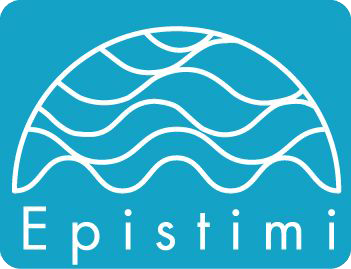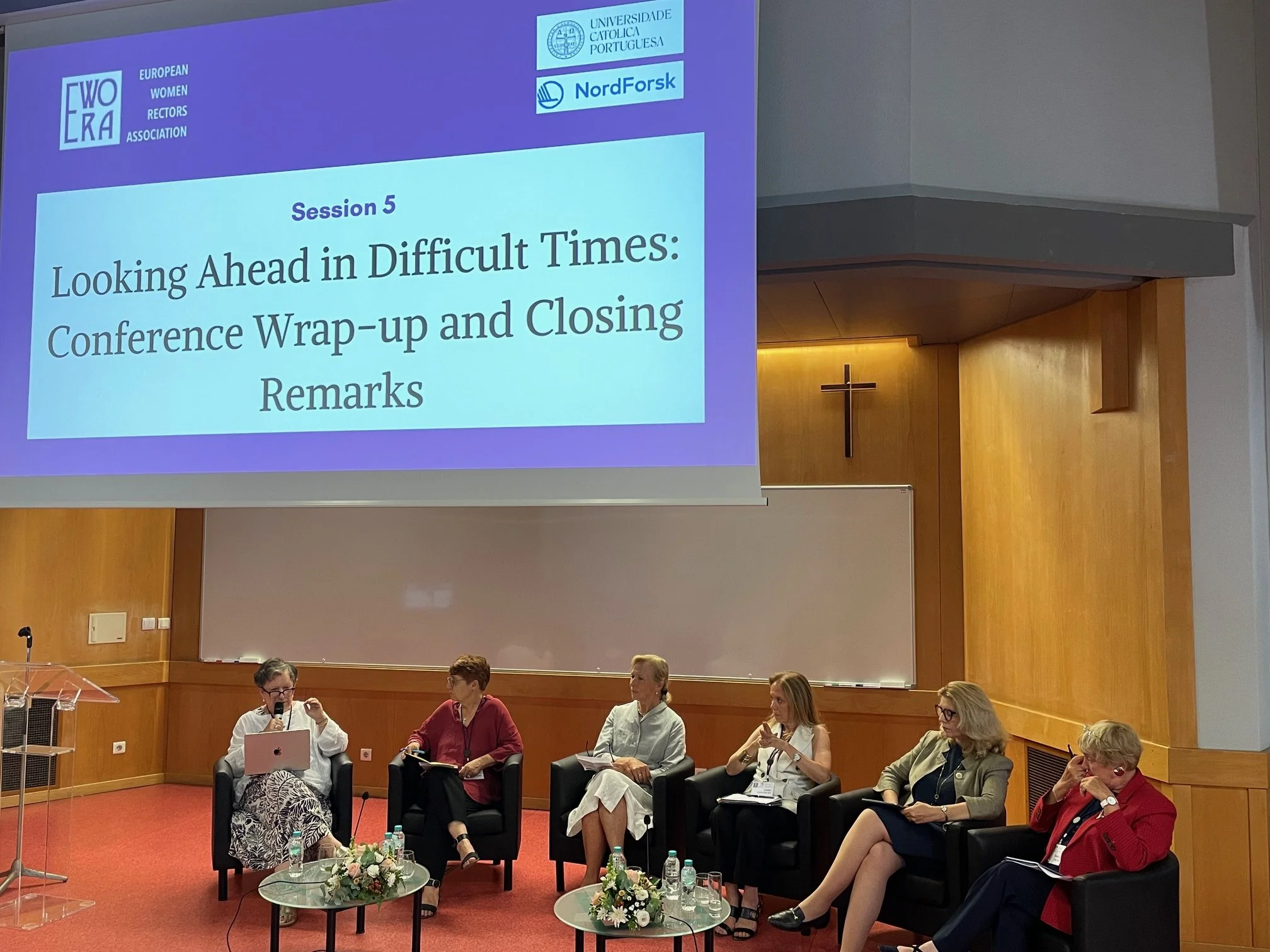Women leading European universities discuss values-based leadership
Source: photograph by J. Hering
Values-based leadership offers a path for engaging both academic colleagues and external stakeholders in the university mission.
By Janet G. Hering with Patricia A. Maurice
25 November 2025, DOI: 10.5281/zenodo.17657891
Members (and guests) of the European Woman Rectors Association (EWORA) [1] met in Lisbon on 26-27 June to discuss values-based leadership in academia and how it could serve to strengthen and sustain gender equality [2]. The conference – on the topic “Gender Equality in the Academy is Fragile. Is Values-Led Leadership the Answer?” – was hosted by the Universidade Católica Portuguesa (UCP), whose leader, Prof. Isabel Gil [3], was a strong and encouraging voice throughout the two-day event.
Values-based leadership was defined by speaker David Lock, Secretary General of the Magna Charta Observatory (MCO) [4] as “a leadership approach where leaders make decisions and guide their teams based on their own core values and the values of the organization. It emphasizes authenticity, integrity and creating a culture where values are deeply embedded and guide behavior”. For MCO, values-based leadership is a natural outgrowth of the 1988 Magna Charta, updated in 2020 as the Magna Charta Universitatum. The 2020 update affirms the three original principles from 1988:
Independence: research and teaching must be intellectually and morally independent of all political influence and economic interests.
Inseparability of teaching and research: students should be engaged in the search for knowledge and greater understanding.
Free inquiry and debate: the university should be open to dialogue and reject intolerance.
Nearly 1000 universities world-wide have endorsed one or both of the 1988 and 2020 pledges.
EWORA as a resource and convening authority
EWORA has its origins in a 2006-2008 European Union (EU) project, which convened a group of women rectors in Istanbul as a pre-event to the final project dissemination conference [5]. Subsequently, three biennial conferences were hosted by the Istanbul Technical University. The European Women Rectors Platform (EWRP) was formed in 2010 and succeeded in 2015 by EWORA, a non-profit organization based in Brussels. The founding President of EWORA, Prof. Gülsün Sağlamer [6], attended the conference in Lisbon.
Membership in EWORA is open to women who are (or were previously) rectors, presidents or chancellors of European universities as full members and to current or former female vice rectors, presidents or chancellors as associate members. Institutional memberships are also possible. In addition to its biennial conference, EWORA offers webinars and podcasts and publishes position papers. At the conference, EWORA President Prof. Kerstin Tham highlighted the importance of EWORA’s status as an independent organization. As she wrote in a recent position paper on “Securing and Sustaining Women’s Leadership in Higher Education”, EWORA “can draw on the experience and expertise of its members to significantly contribute to the promotion of and development of women in leadership roles within higher education” [7].
A partnership between EWORA and MCO on values-based leadership
As explained by David Lock, values-based leadership emphasizes: the autonomy of universities, specifically in their intellectual independence from political authority and economic power; the essential linkage between research and teaching; academic freedom; and the goal of attaining universal knowledge. This is the basis for MCO’s Living Values project, in which “guidelines and resources to enable universities across the world to define, achieve engagement with and live effectively in accordance with their values” [8] were developed. The project is predicated on enabling universities to adhere not only to the fundamental values of intellectual autonomy and academic freedom but also to the principle of social responsibility toward their communities and other values specific to institutional missions.
This not to say that coming to a consensus on values will always be an easy endeavor or to deny that consensus on values may conflict with tolerance of diverging viewpoints. Many traditional values that are taken for granted within university cultures may fail to reflect the lived experiences of female academics and leaders. This highlights the importance for women of being aware of the core values of their institution (usually described in the institutional charter and mission statement), especially before accepting a leadership position.
In the context of EWORA’s objective to reduce the fragility of gender equality in academia, values-based leadership could be advantageous in allowing leaders to promote dialogue and engagement both within the university and with external stakeholders. This approach may be particularly attractive to women leaders, since it offers an alternative to conventional ways of exercising power, such as by relying on personal charisma or controlling access to resources. As discussed in our previous post on power, it is important that women leaders are aware of power dynamics in order to achieve their leadership goals [9].
Looking ahead in difficult times
After sessions on gender disparity in artificial intelligence and on promoting senior academic leadership among women, the conference closed with a session on “Looking ahead in difficult times”. This theme could hardly be more timely given the economic and political pressures that universities find themselves subject to. Values-based leadership was seen as contributing to institutional resilience since agreeing and articulating their values allows universities to build a basis for decision making in the face of current complexities and uncertainties.
As stated in the conference title, gender equality in academia is fragile. Some of the hard-earned gains in women’s representation in leadership have already been lost. Speakers in the closing panel emphasized that gender equity is an essential component of values-based leadership. They also stressed the power of networks, with EWORA itself as a prime example.
Concluding comments and questions for further discussion
I feel privileged to have been able to attend this stimulating conference and to meet many women in top leadership positions in European universities. Readers who would be eligible to join EWORA or would simply like to take advantage of the resources that the association offers, can visit the website [1] or follow EWORA on LinkedIn [10].
In closing, here are a few questions to stimulate further thought and discussion:
· How do you see EWORA’s potential to close the prevailing and persistent gender gap in senior leadership in European universities?
· How do you think that EWORA could increase its membership?
· What would you like to see EWORA offer to women who are not (yet) eligible for membership?
Notes, links, and references
[1] In Europe, the term “rector” is often used equivalently to president or chancellor. For the EWORA homepage, see: https://www.ewora.org/ (Accessed July 19, 2025)
[2] https://www.ewora.org/news/158 (Accessed November 20, 2025). The final conference report is available at: https://www.ewora.org/storage/app/public/uploads/XbsxVJe88TmYJyiMhSkL5EYwHzbwhpfsxEyqnma3.pdf (accessed November 20, 2025)
[3] https://fch.lisboa.ucp.pt/person/isabel-capeloa-gil (Accessed July 19, 2025)
[4] https://www.magna-charta.org/ (Accessed July 19, 2025)
[5] https://www.ewora.org/about (Accessed July 19, 2025)
[6] https://en.wikipedia.org/wiki/G%C3%BCls%C3%BCn_Sa%C4%9Flamer (Accessed July 19, 2025)
[7] https://www.ewora.org/news/156 (Accessed July 19, 2025)
[8] https://www.magna-charta.org/activities-and-projects/living-values (Accessed July 19, 2025)
[9] https://www.epistimi.org/blog/an-introduction-to-power-for-women-in-stemm-academic-leadership

